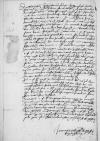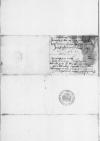Mir ist negst Ew(e)r F(urstlichen) D(urchlauch)t cf. Albrecht I von Hohenzollern-Ansbach to Ioannes DANTISCUS Königsberg, 1536-09-04, CIDTC IDL 6042⌊schreib(e)ncf. Albrecht I von Hohenzollern-Ansbach to Ioannes DANTISCUS Königsberg, 1536-09-04, CIDTC IDL 6042⌋ mit den newen zceitung(en), / dat(um) Königsberg (Królewiec, Mons Regius, Regiomontium), city in Ducal Prussia, on the mouth of the Pregel (Pregoła) river, capital city of Ducal Prussia; today Kaliningrad in Russia⌊KonigspergKönigsberg (Królewiec, Mons Regius, Regiomontium), city in Ducal Prussia, on the mouth of the Pregel (Pregoła) river, capital city of Ducal Prussia; today Kaliningrad in Russia⌋, IIII dits monts, worden(n), / do vor ich E(wer) D(urchlauch)t mit fleis hochen danck thu sag(en). / Und schicke hiemit, was mir Charles V of Habsburg (*1500 – †1558), ruler of the Burgundian territories (1506-1555), King of Spain as Charles I (1516-1556), King of Naples and Sicily, King of the Romans (1519-1530), Holy Roman Emperor of the German Nation (elected 1519, crowned 1530, abdicated 1556); son of Philip I the Handsome and Joanna the Mad of Castile⌊kay(serliche)r m(aieste)tCharles V of Habsburg (*1500 – †1558), ruler of the Burgundian territories (1506-1555), King of Spain as Charles I (1516-1556), King of Naples and Sicily, King of the Romans (1519-1530), Holy Roman Emperor of the German Nation (elected 1519, crowned 1530, abdicated 1556); son of Philip I the Handsome and Joanna the Mad of Castile⌋ botschaffter aus Hungary (Kingdom of Hungary)⌊Hungern(n)Hungary (Kingdom of Hungary)⌋, der Johan Weze (*1490 – †1548), secretary to King Christian II of Denmark; in 1522 nominated Archbishop of Lund; in 1527 was banished from Denmark as Christian II's secretary, and joined the service of Emperor Charles V as his diplomat, 1537-1548 Bishop of Constance (WHALEY, p. 314)⌊erwelt erczbischoff von LundenJohan Weze (*1490 – †1548), secretary to King Christian II of Denmark; in 1522 nominated Archbishop of Lund; in 1527 was banished from Denmark as Christian II's secretary, and joined the service of Emperor Charles V as his diplomat, 1537-1548 Bishop of Constance (WHALEY, p. 314)⌋, / den andren tag Augusti von Nagyvarad (Varadinum), city in Hungary, Transylvania, on the Sebes-Körös (Crisul Repede) river, today Oradea in western Romania⌊VaradeinNagyvarad (Varadinum), city in Hungary, Transylvania, on the Sebes-Körös (Crisul Repede) river, today Oradea in western Romania⌋ bey seine cf. Johan WEZE to Ioannes DANTISCUS Nagyvarad (Varadinum), 1536-08-02, CIDTC IDL 5505⌊brivecf. Johan WEZE to Ioannes DANTISCUS Nagyvarad (Varadinum), 1536-08-02, CIDTC IDL 5505⌋ hot gebund(en), / wor aus E(wer) F(urstliche) D(urchlauch)t wirt vorsthen, mit was practiken mein freundt, h(er) Cornelis De Schepper (Cornelius Scepperus, Cornelis De Dobbele, Cornelius Duplicius) (*1503 – †1555), erudite, diplomat in the Habsburgs' service; close friend of Ioannes Dantiscus; initially in the service of Christian II of Oldenburg, King of Denmark; 1526 secretary and councillor to Emperor Charles V of Habsburg (CE, vol. 3, p. 218-220; DE VOCHT 1961, p. 15-24)⌊Cornelius ScepperusCornelis De Schepper (Cornelius Scepperus, Cornelis De Dobbele, Cornelius Duplicius) (*1503 – †1555), erudite, diplomat in the Habsburgs' service; close friend of Ioannes Dantiscus; initially in the service of Christian II of Oldenburg, King of Denmark; 1526 secretary and councillor to Emperor Charles V of Habsburg (CE, vol. 3, p. 218-220; DE VOCHT 1961, p. 15-24)⌋, in den hendlen um(m)b Denmark (Dania)⌊Dennemarken(n)Denmark (Dania)⌋ ist um(m)bgang(en), / der mir bisher uff mein weitlofftig cf. Ioannes DANTISCUS to Cornelis [DE SCHEPPER] Löbau (Lubawa), 1536-02-24, CIDTC IDL 1421⌊schreiben(n)cf. Ioannes DANTISCUS to Cornelis [DE SCHEPPER] Löbau (Lubawa), 1536-02-24, CIDTC IDL 1421⌋, / dar innen E(wer) D(urchlauch)t erbitten gewest, / nichts geantwurt, / derwegen weiter im zuschreib(e)n, / wie E(wer) F(urstliche) D(urchlauch)t durch h(e)r Johann von Werden (Constellatus, cf. HE, No. 148, p. 150, footnote No. 12) (*1495 – †1554), 1526 Mayor of Gdańsk (Danzig), from 1527 Starost of Neuenburg (Nowe), 1532-1535, 1538, 1539, 1546, 1551 Burgrave of Gdańsk, from 1535 Starost of Preußisch Mark (Przezmark) (1535-1540 together with Achatius von Zehmen (Cema)), 1536/1537 envoy of the Council of Royal Prussia to the Diet of the Kingdom of Poland held in Cracow (SBPN 4, p. 433-435; ZDRENKA 2, p. 368-369; MAŁŁEK 1976, p. 93, 161)⌊Hansen von Werd(en)Johann von Werden (Constellatus, cf. HE, No. 148, p. 150, footnote No. 12) (*1495 – †1554), 1526 Mayor of Gdańsk (Danzig), from 1527 Starost of Neuenburg (Nowe), 1532-1535, 1538, 1539, 1546, 1551 Burgrave of Gdańsk, from 1535 Starost of Preußisch Mark (Przezmark) (1535-1540 together with Achatius von Zehmen (Cema)), 1536/1537 envoy of the Council of Royal Prussia to the Diet of the Kingdom of Poland held in Cracow (SBPN 4, p. 433-435; ZDRENKA 2, p. 368-369; MAŁŁEK 1976, p. 93, 161)⌋ von mir begert, / mich nicht bedunckt zur sach(e)n furderlich oder grot(e)n. Der zcug, Copenhagen (København, Hafnia), city in Denmark, on the Zeeland and Amager islands⌊Coppenhag(en)Copenhagen (København, Hafnia), city in Denmark, on the Zeeland and Amager islands⌋ zu entseczen, hot an dem gefelet, / wie mir Johan Weze (*1490 – †1548), secretary to King Christian II of Denmark; in 1522 nominated Archbishop of Lund; in 1527 was banished from Denmark as Christian II's secretary, and joined the service of Emperor Charles V as his diplomat, 1537-1548 Bishop of Constance (WHALEY, p. 314)⌊der von LundenJohan Weze (*1490 – †1548), secretary to King Christian II of Denmark; in 1522 nominated Archbishop of Lund; in 1527 was banished from Denmark as Christian II's secretary, and joined the service of Emperor Charles V as his diplomat, 1537-1548 Bishop of Constance (WHALEY, p. 314)⌋ schreibt, / das durch anhalden des von The Höchstetters one of the most powerful merchant families in sixteenth-century Europe⌊Hochstraten(n)The Höchstetters one of the most powerful merchant families in sixteenth-century Europe⌋, / dem hirum(m)b schuld wirt geben(n), / die The Netherlanders ⌊HollanderThe Netherlanders ⌋ zu solchem zcoge wider Denmark (Dania)⌊DennemarkenDenmark (Dania)⌋ nichts hab(e)n wollen helffen, / und halts do vor, vordan ouch nicht thun werden(n) etc.
Zu E(wer) F(urstlichen) D(urchlauch)t reise in Germany (Germania, Niemcy)⌊DeuczlandGermany (Germania, Niemcy)⌋ / und Christian III of Oldenburg (*1503 – †1559), 1534-1559 King of Denmark and Norway, 1523-1559 Duke of Holstein and Schleswig; son of Frederick I of Oldenburg, King of Denmark, and his first consort, Anna of Brandenburg⌊ko(nigliche)r w(irde) zu Dennemark(en)Christian III of Oldenburg (*1503 – †1559), 1534-1559 King of Denmark and Norway, 1523-1559 Duke of Holstein and Schleswig; son of Frederick I of Oldenburg, King of Denmark, and his first consort, Anna of Brandenburg⌋ kronung / wunsche ich von Gote dem almechtig(en) vil heils und glukselige wolfart. / Sein gottliche gnad fur E(wer) D(urchlauch)t gesunt wider heim und gebe der kronunge eine fridliche regirung / und ein starken, rwelichen bestant.
Dieweil E(wer) F(urstliche) D(urchlauch)t in vorgeno(m)men wege in mein(n) armut gen Kulmsee (Chełmża, Culmense), town in northern Poland, Kulm Lake District, between Kulm and Thorn, 1251-1824 the seat of the Kulm bishops, with a cathedral and a collegiate church⌊ColmesheKulmsee (Chełmża, Culmense), town in northern Poland, Kulm Lake District, between Kulm and Thorn, 1251-1824 the seat of the Kulm bishops, with a cathedral and a collegiate church⌋ wirt gelangen(n), / bitt ich, wolde in gunst vor gut an nhemen(n), was dar arme haus vormag / und mich hiemit fruntlich befholen haben(n). Got unser herre gebe E(wer) F(urstlichen) D(urchlauch)t zu langen zceiten gesuntheit und alles, was leyb un(n)d sele gut ist. /
 GStA, PK, HBA, C 2, No 111, 2 unnumbered
GStA, PK, HBA, C 2, No 111, 2 unnumbered  GStA, PK, HBA, C 2, No 111, 1 unnumbered
GStA, PK, HBA, C 2, No 111, 1 unnumbered 
